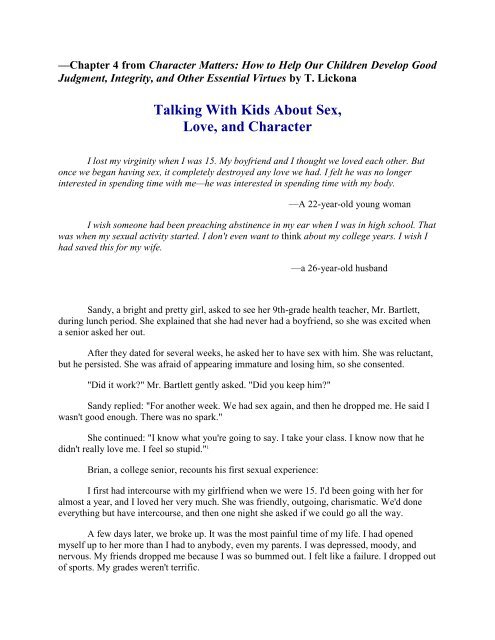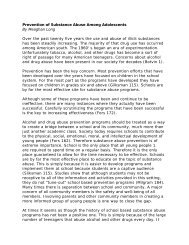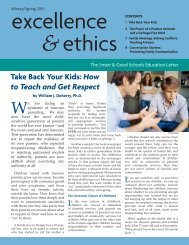How to Talk to Kids About Sex, Love, and Character
How to Talk to Kids About Sex, Love, and Character
How to Talk to Kids About Sex, Love, and Character
- No tags were found...
Create successful ePaper yourself
Turn your PDF publications into a flip-book with our unique Google optimized e-Paper software.
—Chapter 4 from <strong>Character</strong> Matters: <strong>How</strong> <strong>to</strong> Help Our Children Develop GoodJudgment, Integrity, <strong>and</strong> Other Essential Virtues by T. Lickona<strong>Talk</strong>ing With <strong>Kids</strong> <strong>About</strong> <strong>Sex</strong>,<strong>Love</strong>, <strong>and</strong> <strong>Character</strong>I lost my virginity when I was 15. My boyfriend <strong>and</strong> I thought we loved each other. Bu<strong>to</strong>nce we began having sex, it completely destroyed any love we had. I felt he was no longerinterested in spending time with me—he was interested in spending time with my body.—A 22-year-old young womanI wish someone had been preaching abstinence in my ear when I was in high school. Thatwas when my sexual activity started. I don't even want <strong>to</strong> think about my college years. I wish Ihad saved this for my wife.—a 26-year-old husb<strong>and</strong>S<strong>and</strong>y, a bright <strong>and</strong> pretty girl, asked <strong>to</strong> see her 9th-grade health teacher, Mr. Bartlett,during lunch period. She explained that she had never had a boyfriend, so she was excited whena senior asked her out.After they dated for several weeks, he asked her <strong>to</strong> have sex with him. She was reluctant,but he persisted. She was afraid of appearing immature <strong>and</strong> losing him, so she consented."Did it work?" Mr. Bartlett gently asked. "Did you keep him?"S<strong>and</strong>y replied: "For another week. We had sex again, <strong>and</strong> then he dropped me. He said Iwasn't good enough. There was no spark."She continued: "I know what you're going <strong>to</strong> say. I take your class. I know now that hedidn't really love me. I feel so stupid." 1Brian, a college senior, recounts his first sexual experience:I first had intercourse with my girlfriend when we were 15. I'd been going with her foralmost a year, <strong>and</strong> I loved her very much. She was friendly, outgoing, charismatic. We'd doneeverything but have intercourse, <strong>and</strong> then one night she asked if we could go all the way.A few days later, we broke up. It was the most painful time of my life. I had openedmyself up <strong>to</strong> her more than I had <strong>to</strong> anybody, even my parents. I was depressed, moody, <strong>and</strong>nervous. My friends dropped me because I was so bummed out. I felt like a failure. I dropped ou<strong>to</strong>f sports. My grades weren't terrific.
I didn't go out again until I got <strong>to</strong> college. I've had mostly one-night st<strong>and</strong>s. I'm afraid offalling in love. 22As parents <strong>and</strong> educa<strong>to</strong>rs, we worry about many areas of our children‟s decisionmaking—sex,drugs, drinking, drinking <strong>and</strong> driving—where the wrong choices can carry a highcost now <strong>and</strong> in their future. But we sense that they are most vulnerable, most at risk emotionallyas well as physically, in the sexual area of their lives. The damage <strong>to</strong> our children‟s health, heart,<strong>and</strong> character from premature sexual involvement may go deeper, <strong>and</strong> last longer, than theeffects of any other mistakes they might make. "I‟m 42 years old," a high school teacher said <strong>to</strong>me after a workshop on this <strong>to</strong>pic, "<strong>and</strong> I‟m still dealing with emotional issues stemming fromsexual relationships when I was young." Because sexual decisions have such important lifeconsequences, a strong home-school partnership—committed <strong>to</strong> helping our children make wisechoices—is nowhere more important than it is in this domain.<strong>Sex</strong>, however, is delicate terri<strong>to</strong>ry. Raise any sex-related issue—premarital sex, abortion,contraception, homosexuality, sex education in the schools—among ten adults <strong>and</strong> you‟re likely<strong>to</strong> get eleven opinions. <strong>Sex</strong> is the battleground for most of our country‟s culture wars.But 30-plus years after the sexual revolution, there is an emerging consensus about somethings. <strong>Sex</strong> is not a trivial matter. It‟s not a recreational sport. <strong>Sex</strong> has strong consequences, evenif you rarely see them depicted on TV or in the movies. It can create a new life. It can wreck alife. It can express a beautiful love. It can be the furthest thing from love.<strong>Sex</strong> is powerful. And because it‟s powerful, societies around the world <strong>and</strong> down throughhis<strong>to</strong>ry have sought <strong>to</strong> surround it with prudent boundaries that channel its power <strong>to</strong>wardconstructive ends, ones that serve the individual good <strong>and</strong> the common good, ones that buildhealthy families <strong>and</strong> a strong society.Despite the continuing battles about sex education, there‟s emerging common groundthere, <strong>to</strong>o. <strong>Sex</strong> is not for kids. Abstinence is the wisest choice for many reasons. More than ahalf-million unmarried teens get pregnant each year. Having a baby when you are an unmarriedteenager is the surest route <strong>to</strong> poverty for you <strong>and</strong> your child. The U. S. has the highest teenabortion rate in the developed world. One in three sexually active singles gets an STD by age 24.Until the mid-1970s, there were only two common STDs—syphilis <strong>and</strong> gonorrhea; now there aremore than 20. An estimated 70 million Americans have a sexually transmitted disease.Condoms haven‟t solved these problems. Condom use over the past 20 years hasincreased most among teens, but teens show the greatest increase of STDs during that sameperiod. Two decades of medical research 3 on condoms, pregnancy, <strong>and</strong> STDs, including a 2001National Institutes of Health report, have produced these findings:The typical first-year failure rate for adult couples using condoms <strong>to</strong> prevent pregnancy is14%. The failure rate among teens is significantly higher because alcohol or drug useoften reduces their ability <strong>to</strong> use condoms correctly or at all.Condoms reduce sexual transmission of HIV/AIDS by about 85% if they are used 100%of the time, leaving a 15% risk of HIV infection even with 100% use.
3Very few persons use condoms 100% of the time. Most people infected with an STDdon‟t know it because they do not yet have any visible symp<strong>to</strong>ms. Even among adultswho knew their partner had HIV, for example, only 56% used condoms every time.Condoms do not prevent STD transmission caused by skin-<strong>to</strong>-skin contact with aninfected part of the body not covered by the condom.Girls are more susceptible <strong>to</strong> STDs than boys because they have a larger surface (thelining of the vagina) vulnerable <strong>to</strong> infection than males. The risk of a girl contractingHIV/AIDS from a boy is eight times greater than the risk of a boy getting HIV from agirl. Women suffer more of the severe health complications of STDs, such as cervicalcancer <strong>and</strong> infertility, than do men.Even with 100% condom use, there is no evidence of any risk reduction of humanpapilloma virus (HPV), the cause of virtually all cervical cancer.Even with 100% condom use, there remains a 50% risk of contracting chlamydia, thefastest growing cause of infertility.For human beings, of course, sex is about much more than the body. It‟s the emotional<strong>and</strong> spiritual dimensions of sex that make it distinctively human. "<strong>Sex</strong> is essentially deep,"observed the philosopher Dietrich von Hildebr<strong>and</strong>. Our entire person, soul <strong>and</strong> body, is involved.That‟s why sex has uniquely powerful emotional <strong>and</strong> spiritual consequences. And there is nocondom for the heart.To educate adequately about human sexuality, both schools <strong>and</strong> parents must address theemotional hurts <strong>and</strong> regrets that commonly follow temporary sexual relationships. According <strong>to</strong>a 2000 survey conducted by the National Campaign <strong>to</strong> Prevent Teen Pregnancy, 63% of teenageyouth (72% of girls <strong>and</strong> 55% of boys) who have had sexual intercourse say they wish they hadwaited. Many adults express similar feelings. Wendy Shalit, in her book A Return <strong>to</strong> Modesty,cites a 1998 issue of Glamour magazine reporting that the women most happy with their sexualdecisions were those like Nina, 30, who had had only one lover—her husb<strong>and</strong>. She says she isgrateful <strong>to</strong> have "experienced the thrill" of having only her spouse as her sexual partner. Womenwho were unhappy with their sexual decisions tended <strong>to</strong> make comments like those of Ellen, 29:"I wish I hadn‟t given so much of myself—I feel that some of my experiences thinned my soul,<strong>and</strong> such an effect takes time <strong>to</strong> undo." A 21-year-old woman from Canada wrote in <strong>to</strong> say thatshe had had 17 partners because she was "looking for comfort in my first year of college." 4A young married woman confided <strong>to</strong> her counselor: "I had a lot of partners beforemarriage. I know it‟s affected my ability <strong>to</strong> bond with my husb<strong>and</strong>." Says Dr. John Diggs, aphysician-abstinence educa<strong>to</strong>r who talks <strong>to</strong> students about human relationships: "You can havemany friends, but it doesn‟t work <strong>to</strong> have many sexual partners."Although the emotional fallout from uncommitted sex is only recently getting attention,we‟ve known about it for a long time. At a 1999 "Beyond Relativism" conference at GeorgeWashing<strong>to</strong>n University, Dr. Arm<strong>and</strong> Nicholi, clinical professor of psychiatry at Harvard MedicalSchool, commented:
Not long after the sexual revolution was underway [in the late 60s], clinicians—evenorthodox Freudians—observed that the new sexual freedom was creating a psychologicaldisaster. We began <strong>to</strong> study Harvard students who complained of emptiness <strong>and</strong> despondency.4There was a gap between their social conscience <strong>and</strong> the morality of their personal lives.The new sexual permissiveness was leading <strong>to</strong> empty relationships <strong>and</strong> feelings of self-contempt.Many of these students were preoccupied with the passing of time <strong>and</strong> with death. They yearnedfor meaning, for a moral framework. When some of them moved away from moral relativism <strong>to</strong>a system of clear values—typically embracing a drug-free lifestyle <strong>and</strong> strict sexual code—theyreported that their relationships with the opposite sex improved, as did their relations with peersin general, their relationship with their parents, <strong>and</strong> their academic performance.Dr. Carson Daly says that when she was a college English professor, many students—usually young women but sometimes guys—would come <strong>to</strong> see her, ostensibly about a paperthey‟d written for her course. Once in<strong>to</strong> the conversation, they would tell her about problemsthey were having in a relationship. <strong>Sex</strong> was almost always involved. She says:I don't think I ever met a student who was sorry he or she had postponed sexual activity,but I certainly met many who deeply regretted their sexual involvements. Time <strong>and</strong> time again, Ihave seen the long-term emotional <strong>and</strong> spiritual desolation that results from uncommitted sex.No one prepares young people for these effects: the lowered self-esteem; the despairingsense of having been used; the self-contempt for being a user; the unease about having <strong>to</strong> lieabout or at least conceal one‟s activities from family members <strong>and</strong> others; the difficulty ofbreaking the cycle of compulsive sexual behavior; <strong>and</strong> the self-hatred of seeking, after eachbreak-up, someone else <strong>to</strong> seduce in order <strong>to</strong> revive one‟s fading self-image."No one tells young people," Dr. Daly says, "that it sometimes takes years <strong>to</strong> recoverfrom the effects of these sexual experiences—if one ever fully recovers."Finally, there is a growing recognition on the part of schools <strong>and</strong> society that sexualbehavior, while a matter of personal values, is nevertheless subject <strong>to</strong> ethical evaluation becauseit affects the welfare of self <strong>and</strong> others. Ethical sexuality, acting with respect for oneself <strong>and</strong>others, is part of good character. <strong>Sex</strong> education must therefore be character education. It must, inthe words of Bos<strong>to</strong>n educa<strong>to</strong>r Dr. Kevin Ryan, teach students "<strong>to</strong> see sexuality as an area of theirlives that calls for the presence of virtues." Our children should realize, Ryan points out, thatlearning <strong>to</strong> bring self-discipline <strong>to</strong> their sexuality is a means of developing their character—<strong>and</strong> ameans of preparing themselves for a deep, loving relationship as an adult.A SEXUALLY TOXIC ENVIRONMENTFor both schools <strong>and</strong> families, the task of teaching sexual wisdom is made much moredifficult by the fact that young people <strong>to</strong>day are growing up in a world that pushes sex at them
constantly. A mother of an 8th-grader picked up a copy of Teen People magazine for the firsttime <strong>and</strong> was "amazed . . . it was page after page of young teens dressed in very provocativeways <strong>and</strong> in very provocative poses." 55The sexualizing of the young <strong>and</strong> the way it warps their development are evident allaround us. A colleague who directs a character education center recounted a conversation with a13-year-old boy who "spoke enthusiastically about all the pornography he watches with hisfriends. All kinds of sex—oral sex, anal sex, you name it. He says older kids rent these videosfrom the adult section of the video s<strong>to</strong>res <strong>and</strong> then pass them around <strong>to</strong> the junior high kids. Hesaid he <strong>and</strong> his friends also play „Truth or Dare,‟ in which they perform sexual acts on eachother."A 6th-grade girl in a nearby small <strong>to</strong>wn <strong>to</strong>ld her school counselor she had sex with herboyfriend in 5th-grade <strong>and</strong> didn‟t underst<strong>and</strong> why she was upset afterwards. Through tears sheasked the counselor, "Why didn‟t someone tell me not <strong>to</strong> do this?"A 3rd-grade girl in another small community asked her student teacher if she hadwatched Beverly Hills 90210 the night before. When the student teacher said no, this 8-year-oldsaid, "Oh, you missed a good one, because Dylan is smoking pot now, <strong>and</strong> Br<strong>and</strong>on <strong>and</strong> Kellyhad sex." Beverly Hills 90210 was the favorite show of most of these 3rd-graders.The educa<strong>to</strong>r James Coughlin sums up this scene: "We socialize kids <strong>to</strong> have sex. Noculture in human his<strong>to</strong>ry has ever done this <strong>to</strong> its children."WHAT KIDS NEED TO AVOID PREMATURE SEXIn this kind of hostile moral environment, how can we safeguard our children <strong>and</strong> teachthem sexual self-control? <strong>How</strong> can we help them make sexual decisions that will strengthen theircharacter, increase their chances of a happy life, <strong>and</strong> build a healthy society?First of all, we need <strong>to</strong> have confidence that both schools <strong>and</strong> families can make apositive difference. Studies, for example, consistently show that parents can have a major impac<strong>to</strong>n their children‟s decision <strong>to</strong> delay sex, especially when parents send a clear message aboutwhere they st<strong>and</strong>. 6 Other research shows that a well-designed school curriculum, one that takes aclear st<strong>and</strong> on abstinence <strong>and</strong> teaches definite behavioral norms (e.g., "If you‟re not ready <strong>to</strong> be aparent, you‟re not ready for sex"), can succeed in fostering sexual restraint. 7In order for young people <strong>to</strong> wait, they need three things: (1) internally held convictionsabout why it makes sense <strong>to</strong> save sexual intimacy for a truly committed relationship; (2)strengths of character—such as good judgment, self-control, modesty, genuine respect for self<strong>and</strong> others, <strong>and</strong> the courage <strong>to</strong> resist pressure <strong>and</strong> temptation; <strong>and</strong> (3) support systems for livingout this commitment—including, ideally, support from their families, faith communities,schools, <strong>and</strong> at least one good friend who has made the same decision.
6MAKE IT CLEAR THAT EVERYBODY IS NOT DOING ITFor starters, teachers <strong>and</strong> parents can point out <strong>to</strong> kids that growing numbers of youngpeople are waiting.A December 2002 Newsweek cover s<strong>to</strong>ry titled "The New Virginity" reported the Centersfor Disease Control‟s latest data: High school students who have not had sexual intercourse arenow in a majority (52%) for the first time in 25 years. Moreover, only one of three students saythey are "currently sexually active." 8 Most of this change is accounted for by an increase in thevirginity rate—up more than 10% in the 1990s—among high school boys. 9Similar trends are showing up at the college level. On UCLA's annual AmericanFreshman survey, the percentage of entering college students agreeing with the statement, "Iftwo people really like each other, it's all right for them <strong>to</strong> have sex even if they've known eachother only a very short time," dropped from 51% in 1990 <strong>to</strong> 41% by the end of the decade.HELP KIDS UNDERSTAND WHY SOMEYOUNG PEOPLE GET SEXUALLY INVOLVEDDespite these positive trends, plenty of young people are still having sex. <strong>Kids</strong> are lesslikely <strong>to</strong> be pulled in that direction themselves if they have psychological insight in<strong>to</strong> the reasonswhy some of their peers get sexually involved. Knowledge is power. As parents <strong>and</strong> educa<strong>to</strong>rs,we can help young people step back from the scene, get outside themselves, <strong>and</strong> underst<strong>and</strong> themany fac<strong>to</strong>rs, internal <strong>and</strong> external, that can lead <strong>to</strong> sexual involvement.1. No good reason not <strong>to</strong>. If you cannot give yourself good reasons for not having sex,chances are high that sooner or later you‟ll engage in this behavior. "I got sexually involved,"says a college senior, "because I couldn‟t answer the question, „Why shouldn’t I have sex?‟ Igave in because I figured that since I didn‟t have a solid answer, I must be wrong. I also read allthis stuff that claimed that virginity is unnatural, abnormal, <strong>and</strong> „repressed.‟"2. Partner pressure. Pressure from a partner—a boyfriend or girlfriend they wanted <strong>to</strong>keep—is, according <strong>to</strong> polls, the reason teens most often cite for their initial decision <strong>to</strong> havesex. 10 The pressure doesn‟t necessarily come from the boy; increasingly, it comes from the girl—<strong>and</strong> boys aren‟t prepared <strong>to</strong> h<strong>and</strong>le it. Says one 17-year-old girl: "Guys have trouble dealing withgirls who come on <strong>to</strong> them. They don‟t want the word <strong>to</strong> get around school that they refused."3. Pleasure. For some kids, the draw is mainly physical. Said an 8th-grade boy: "<strong>Sex</strong> ispleasurable. It has <strong>to</strong> happen sooner or later—why not now?"4. Desire <strong>to</strong> express love. Many young people think sex is simply a natural way <strong>to</strong>express the love they feel for each other. Says one counselor: "In <strong>to</strong>day‟s world, people tend <strong>to</strong>think you‟re not close <strong>to</strong> somebody unless you‟re having sex with them."5. Desire <strong>to</strong> be normal. Says a health teacher at a private high school in Oregon: "Inrecent years, many kids have gotten it in<strong>to</strong> their heads that they should have sexual intercourse
y the time they are 16. They think something is wrong with them if they haven‟t had thisexperience by this age."76. Early dating. A study published in the Journal of Adolescent Research found thatamong those who did not begin single dating until they were 16 years old, only 16% of boys <strong>and</strong>18% of girls had sexual intercourse by high school graduation. That percentage steadily rose asage of first dating dropped. Among those who began dating when they were 7th-graders, 71% ofboys <strong>and</strong> 90% of girls had intercourse by the time they graduated from high school.7. Steady dating. The same study found that steady dating, which typically increases thetime a couple spends alone, heightened chances of sexual involvement. Among 9th-graders insteady relationships, for example, 70% of boys <strong>and</strong> 60% of girls said they had had sex.8. Need for intimacy. Many young people, especially girls, turn <strong>to</strong> sex <strong>to</strong> try <strong>to</strong> meet theirneed for intimacy. Says John Diggs: "If Dad isn‟t there giving non-sexual attention, a girl willoften go after sexual attention from boys." Marital conflict or break-up often aggravates thispattern. Said a high school sophomore, whose parents were divorcing <strong>and</strong> who had slept with 15boys in the three months since Christmas: "There is so much pain when I go home. For a fewminutes, when a guy holds me, it feels like love."Some girls deliberately get pregnant because they want someone <strong>to</strong> love who will lovethem back. One abstinence education program found that teenage girls who were given a puppywere less likely <strong>to</strong> get pregnant.9. Low self-worth. Says a girl who got pregnant at 15 <strong>and</strong> is now a single parent: "Mybrothers <strong>and</strong> their girlfriends said if you didn‟t do it, you were a nerd. I had always been sort ofan outcast, <strong>and</strong> I didn‟t want <strong>to</strong> be called a nerd." Says another girl: "I‟ve been sexually activesince 4th-grade. I‟ve done it with a lot of guys. It makes me feel wanted."10. The search for identity. For some teens, experimenting sexually is part of breakingaway <strong>and</strong> the search for identity. Says Cheryl Jones, a therapist who specializes in adolescentcounseling: "I see girls who up until now have been the perfect kid: soccer team, pom-pom,straight As, followed all the rules. Then they turn 15 or 16, <strong>and</strong> something in the brain kicks in:„I don‟t want <strong>to</strong> be just what my parents want me <strong>to</strong> be.‟ They know what they don’t what <strong>to</strong> beany longer, but they don‟t know what <strong>to</strong> be—there‟s no sense of self on the inside—so theybecome the opposite, a kind of anti-personality. Their parents are in shock: „Why is thishappening?—this was such a compliant kid.‟"Becoming your own person as a teenager—what psychologists call the process of"individuation"—doesn‟t have <strong>to</strong> involve this kind of rebellion, but it may, especially if kidshaven‟t been developing a sense of their own identity in constructive ways such as makingdecisions about how <strong>to</strong> use their time <strong>to</strong> pursue goals they choose <strong>and</strong> care about. Teenagersneed <strong>to</strong> feel they are not simply extensions of their parents. Even in childhood, parents can helptheir children begin <strong>to</strong> define their own interests <strong>and</strong> sense of self.11. A change in environment. For some young people, sexual activity starts when theyenter a new environment such as college, where there is the potential <strong>to</strong> live much more freely
<strong>and</strong> a permissive peer culture that often includes dorms where sex is as common as a morningshower. A colleague comments: "When you‟re plucked out of the nest <strong>and</strong> dumped on<strong>to</strong> acollege campus, the known world pretty much goes <strong>to</strong> pieces around you."12. Parental permissiveness. For some teens, parental permissiveness while they‟re stillat home sets the stage for sexual involvement. Fourteen-year-old Courtney complained that herparents "let me go over <strong>to</strong> my boyfriend‟s house when they know his parents aren‟t home. Thatis weird." She would pretend that she had her period, but her boyfriend became increasinglyaggressive. Finally, after two <strong>and</strong> a half months, she says, "I just did it because he really keptbothering me about it." 1213. Parents’ example. Says a high school boy who lives with his divorced father:"What‟s the big deal about sex? A lot of my dad‟s girlfriends spend the night."814. Nothing better <strong>to</strong> do. In the South Bronx, New York, where the teen pregnancy rate isnearly twice the national norm, a community agency sponsored an essay contest for adolescentson the question, "<strong>How</strong> Can the Problem of Teenage Pregnancy Be Solved?" One of the winningessays argued that many teens have sex "because they are bored—they have nothing better <strong>to</strong>do." Says the principal of a rural high school in northern New York: "Many of our students have<strong>to</strong>o much time on their h<strong>and</strong>s between 3 <strong>and</strong> 6 pm, when parents often aren‟t home. That‟s whena lot of sexual activity starts." One pregnancy prevention program found that when teens learnedlife skills <strong>and</strong> got involved in meaningful community service, the pregnancy rate dropped.15. The wrong kind of sex education. <strong>Sex</strong> education that doesn‟t send a clear abstinencemessage can be a green light for sexual activity. Says a high school boy in Los Angeles: "Theypass out condoms, teach pregnancy-this <strong>and</strong> STD-that, but they don‟t teach us any rules."16. <strong>Sex</strong>ual abuse. One in four girls <strong>and</strong> one in six boys is sexually abused by age 18.<strong>Sex</strong>ually abused youth, often because of their low self-worth, are more likely <strong>to</strong> become sexuallyactive with peers or older partners. Says a high school counselor: "I‟m working with a girl whowas sexually abused by her father, then in high school turned <strong>to</strong> a boyfriend for „love‟ <strong>and</strong> wassoon pregnant." Says another counselor: "We have a girl who is six months pregnant <strong>and</strong> verydistressed because she doesn‟t know who the father of the baby is—her boyfriend or her father."17. Drugs <strong>and</strong> alcohol. Drugs <strong>and</strong> alcohol impair moral judgment <strong>and</strong> weakeninhibitions. Teens who say they have used drugs or been drunk in the past month, for example,are much more likely <strong>to</strong> have had sex than teens who have never been drunk or used drugs. 1318. A highly sexualized environment. Television, movies, popular songs, advertising,<strong>and</strong> the Internet all combine <strong>to</strong> create a sexually stimulating media culture whose unrelentingmessage is that sex is the center of the universe <strong>and</strong> that sex between people who aren‟tcommitted <strong>to</strong> each other almost never has negative consequences. Add <strong>to</strong> this, the sexualizedpeer environment created by young people themselves, including increasingly provocative dress<strong>and</strong> language on the part of both sexes.When young people gain insight in<strong>to</strong> all the influences that lead many of their peers <strong>to</strong>get sexually involved, they‟re better able <strong>to</strong> withst<strong>and</strong> those influences, make good decisions,
have a sympathetic underst<strong>and</strong>ing of those who may be making less healthy choices, <strong>and</strong>, withour encouragement, reach out when the opportunity presents itself <strong>to</strong> help a peer make a wiserchoice.9TALK ABOUT WHAT COUNTS AS "SEX"Given the fact that many young people are having oral <strong>and</strong> even anal sex <strong>and</strong> still thinkthey‟re "virgins," we want <strong>to</strong> be sure <strong>to</strong> talk about what counts as "sex." Here, for example, aresome things we can say about oral sex, reportedly on the rise:1. Oral sex is definitely a sexual act. (That‟s why they call it oral sex.)2. It‟s usually something boys ask girls <strong>to</strong> perform on them.3. No boy who truly cares about or respects a girl would ever ask her <strong>to</strong> do this.4. All of the sexually transmitted diseases can be passed on through oral sex. Doc<strong>to</strong>rs, forexample, report seeing more <strong>and</strong> more teens with oral herpes.5. If you engage in oral sex, especially if you‟re a girl, you are in danger of experiencing thesame emotional hurts—low self-esteem, feeling used, feeling degraded—that can followuncommitted sexual intercourse.6. If you‟re a boy <strong>and</strong> are getting girls <strong>to</strong> do this, even if they seem willing, you are abusingthe girl (would you want somebody doing this <strong>to</strong> your sister?) <strong>and</strong> abusing your ownsexuality (is this something you want the person you may marry <strong>to</strong> know?).7. If you engage in this behavior, you‟re not treating your body with reverence for thesacred gift that it is. (Even families without religious faith may find it helpful <strong>to</strong> usespiritual language.)Most parents <strong>and</strong> educa<strong>to</strong>rs will also want <strong>to</strong> give guidance about "how far is <strong>to</strong>o far."Not everyone will agree on where <strong>to</strong> draw the line, but I think it‟s best <strong>to</strong> draw itconservatively—for example, at "brief hugs <strong>and</strong> light kissing." We can explain: "<strong>Sex</strong> isprogressive. If you‟re strict with yourself, you won‟t find yourself struggling with the temptation<strong>to</strong> go a little bit farther the next time." A high school counselor put it this way: "If you don‟twant <strong>to</strong> drive over a cliff, don‟t pull up <strong>to</strong> the edge <strong>and</strong> race the engine."TEACH KIDS NON-SEXUAL WAYS TO BE INTIMATESince many kids are looking for love when they get involved in sex, both parents <strong>and</strong>schools need <strong>to</strong> talk <strong>to</strong> them about what real intimacy is <strong>and</strong> how <strong>to</strong> achieve it.
10True human intimacy means knowing another person—their thoughts, feelings, hopes,<strong>and</strong> dreams—<strong>and</strong> being known by them. We have <strong>to</strong> learn how <strong>to</strong> attain this kind of intellectual,emotional, <strong>and</strong> spiritual intimacy. If we don‟t learn how, we‟ll be h<strong>and</strong>icapped in our adultrelationships—in our marriages <strong>and</strong> our relationships with our children. A colleague who doesmarriage counseling observes: "If sex is the only way you learn <strong>to</strong> be intimate as a teenager,that‟s all you‟ll have when you‟re married. In my practice, I see a lot of married couples whodon‟t know how <strong>to</strong> talk <strong>to</strong> each other. They never learned how <strong>to</strong> be emotionally intimate." 14We can teach young people—<strong>and</strong> have them practice it at school <strong>and</strong> at home—the skillsof intimacy, such as the art of asking questions that draw out the inside of another person <strong>and</strong>create meaningful <strong>and</strong> enjoyable conversation. Questions such as:What’s one good thing that happened <strong>to</strong>day?What are two things you really enjoy doing? Why do you enjoy doing them?Who is someone you admire? Why?What makes you feel good about yourself?What is something other people can do <strong>to</strong> make you happy?What do you worry about?What’s one of your greatest achievements in life so far?What is a way you’ve helped another person? A way another person has helped you?What’s one way you’ve changed as a person?What was a setback or disappointment that was <strong>to</strong>ugh <strong>to</strong> deal with when it happened buthelped you become a stronger or wiser person?<strong>How</strong> do you make decisions about important things?What is something you have strong beliefs about?What is something in your life that you’re grateful for?What are two of your most important goals in life?What do you see as your purpose in life?If you died <strong>to</strong>day, what are two things you’d like people <strong>to</strong> say about you?What is your concept of God, if you believe there is a God? When do you feel closest <strong>to</strong>God?
11OFFER A VISIONYoung persons are thinking human beings, <strong>and</strong> they need a way <strong>to</strong> think about sex thatwill ground them <strong>and</strong> make their decisions solid. It‟s clearly not enough just <strong>to</strong> encourage them<strong>to</strong> "wait." They want <strong>to</strong> know what they‟re waiting for. To get <strong>to</strong> college? To turn a certain age?Until they feel "ready"? Or until they‟re in a mature, committed relationship where sex makessense because it expresses <strong>and</strong> deepens that genuine commitment?His<strong>to</strong>rically, of course, we‟ve called such a commitment marriage. Although marriagecan be ended through divorce, it‟s the only commitment that has any legal power <strong>to</strong> bind oneperson <strong>to</strong> another. In any other commitment, however much people might feel they love eachother, either can walk out the door at any minute with no obligations whatever <strong>to</strong> the otherperson. (Seven of eight cohabitating relationships, for example, break up.)Although not everyone agrees that sex outside marriage is always wrong in an adultrelationship, saving sex for the committed relationship of marriage is increasingly beingpresented <strong>to</strong> students as a decision that has many benefits—for them, the children they may bringin<strong>to</strong> the world, <strong>and</strong> society as a whole. To be effective, however, a "wait for marriage" messagecan‟t be delivered in soapbox fashion with preachy moralizing. It has <strong>to</strong> be offered as a visionwith persuasive power, expressed in rational terms that appeal <strong>to</strong> young people‟s intelligence.Different teachers <strong>and</strong> parents will choose different ways of articulating this vision. Hereis one approach:A lot of people might tell you—the media certainly do—that sex is no big deal. But infact it‟s a very big deal. <strong>Sex</strong> is so special it deserves a special home. It‟s most meaningful, mostfulfilling, when it‟s part of something bigger—a continuing, loving relationship between twohuman beings. When you‟re married, your sexual intimacy expresses your <strong>to</strong>tal commitment <strong>to</strong>each other. You‟re saying with your body, "I give myself <strong>to</strong> you, completely." Not being <strong>to</strong>tallycommitted changes the meaning of the sex act. Then it‟s not part of the complete giving ofyourself. Even if you‟re engaged, you can always get disengaged. Half of the couples who areengaged have been engaged before.From this perspective, you join your bodies when you join your lives. The ultimateintimacy belongs within the ultimate commitment. Marriage certainly isn‟t perfect, <strong>and</strong>marriages can <strong>and</strong> do fail. You have <strong>to</strong> work hard <strong>to</strong> make a marriage succeed. But marriage isthe most serious, <strong>to</strong>tal, <strong>and</strong> public commitment between two people that any human society hasever been able <strong>to</strong> devise. It‟s within this committed relationship that sex is most likely <strong>to</strong> beloving, the dangers of disease <strong>and</strong> emotional hurt are minimized, <strong>and</strong> a family exists <strong>to</strong> parent achild if a pregnancy results from your sexual union.Here‟s a second approach, a little more philosophical but one that adolescents can still gettheir minds around:We‟re all made in such a way that certain choices or ways of acting "work" <strong>and</strong> make ushappy, <strong>and</strong> others don‟t. There‟s a law that governs human nature <strong>and</strong> human relationships, just
12as there‟s a law that governs physical nature. Toss a ball up, <strong>and</strong> it comes down. Treat peoplebadly, <strong>and</strong> you lose their respect <strong>and</strong> eventually your self-respect. Actions have consequences.What are the natural consequences of having sex? Bonding <strong>and</strong> babies. If you have sexwith someone, you‟re very likely <strong>to</strong> create an attachment, a bond. If you have sex, you may alsocreate a new human life, even if you‟re trying <strong>to</strong> avoid that. Both of these consequences—anemotional attachment <strong>and</strong> a new life—can be the source of great happiness in a relationshipwhere two people have made a real commitment <strong>to</strong> stay <strong>to</strong>gether. But if that kind of securecommitment doesn‟t exist, then a child brought in<strong>to</strong> the world won‟t have two parents <strong>to</strong> love<strong>and</strong> raise that child. And if a binding commitment doesn‟t exist, the emotional attachmentcreated by sex will, in most cases, be broken—causing emotional pain.And here‟s a third approach that brings religion in<strong>to</strong> the picture. If you have religiousfaith as a parent, you‟ll want <strong>to</strong> integrate that in<strong>to</strong> the moral upbringing of your child.(Remember, research finds that faith-based beliefs help many youngsters avoid sex, drugs, <strong>and</strong>other harmful activity.) Even public school teachers can objectively describe religious worldviews—in the spirit of teaching about religion, something that the Supreme Court‟s 1963decision (banning school prayer) actually urged schools <strong>to</strong> do as part of their responsibility <strong>to</strong>educate students about their cultural heritage. A teacher can introduce a religious vision ofsexuality by saying, for example, "A public school can‟t constitutionally promote religion, but ithas an obligation in fairness <strong>to</strong> include religious perspectives along with other views." Forexample:Rabbinic teaching for at least 2,500 years has consistently opposed premarital sex.Judaism enshrines sexual intercourse as a sanctified element in the most intimate <strong>and</strong> meaningfulrelationship between two human beings: the sacred marriage bond.—Rabbi Isaac FrankThe promise of two people <strong>to</strong> belong always <strong>to</strong> each other makes it possible forlovemaking <strong>to</strong> mean <strong>to</strong>tal giving <strong>and</strong> <strong>to</strong>tal receiving. It‟s the <strong>to</strong>tality of married life that makessexual intercourse meaningful.—Father Richard McCormickIslam views sexual love as a gift from God. It is a sign of God‟s love <strong>and</strong> mercy. It ispermitted only <strong>to</strong> those couples who have joined themselves in a lawful marriage. —MuzammilSiddiqiTALK ABOUT THE EMOTIONAL DANGERSWhat are the specific emotional dangers of uncommitted sex that we should incorporatein<strong>to</strong> our thinking as adults <strong>and</strong> help young people name <strong>and</strong> underst<strong>and</strong>? Here are 10:1. Worry about pregnancy <strong>and</strong> disease. For many young people who have becomesexually active, the fear of pregnancy or getting a sexually transmitted disease is a majoremotional stress.
13Becky, 13, first had sex with her 15-year-old boyfriend. She knew her parents <strong>and</strong> otherfamily members would be hurt if they found out. When she missed her period, she went in<strong>to</strong> apanic. She even had thoughts of committing suicide. Finally, she confided in her gr<strong>and</strong>mother,who <strong>to</strong>ok her <strong>to</strong> get a pregnancy test. To Becky‟s great relief, it was negative. With hergr<strong>and</strong>mother‟s support, she decided she didn‟t want <strong>to</strong> go though that again <strong>and</strong> broke up withher boyfriend.Says Russell Henke, health education coordina<strong>to</strong>r in the Montgomery Public Schools: "Isee kids going <strong>to</strong> the nurse in schools, crying a day after their first sexual experience, <strong>and</strong>wanting <strong>to</strong> be tested for AIDS. For some, it‟s enough <strong>to</strong> cause them <strong>to</strong> stay away from furthersexual involvement."2. Regret <strong>and</strong> self-recrimination. Both guys <strong>and</strong> girls can suffer sharp regret following asexual relationship, but girls are usually more vulnerable. One abstinence speaker asks his teenaudiences: "What happens when a girl has sex with a boy? She feels closer <strong>to</strong> him. You mightthink it would be the same with a boy. Not necessarily." A girl who sees sex as a way <strong>to</strong> "showyou care" may feel cheated <strong>and</strong> used when the boy doesn‟t show a greater romantic interest afterthe sexual experience. Says a 15-year-old girl: "I didn‟t expect the guy <strong>to</strong> marry me, but I neverexpected him <strong>to</strong> avoid me in school."<strong>How</strong>ever, guys who get emotionally as well as sexually involved with a girl can alsosuffer a lot of hurt when the relationship ends. Here‟s a guy with deep regrets:A year ago I started dating a girl two years younger. We fell head over heels in love.Our parents were friends <strong>and</strong> were overjoyed. They gave us complete freedom. When Iwould go <strong>to</strong> her house, her folks would go <strong>to</strong> bed early so we could be alone.It was wonderful. We were alone <strong>to</strong>gether sometimes as often as six nights a week. Westarted necking a little, <strong>and</strong> then all the time. I started getting a little fresh, <strong>and</strong> she resisted, butshe finally gave in for fear of losing me. One thing led <strong>to</strong> another, <strong>and</strong> before we knew it, we hadgone <strong>to</strong>o far.We started feeling guilty about what we were doing, but we consoled ourselves that wewere in love <strong>and</strong> that as soon as she was out of school, we‟d be married—so what difference didit make? Then one night we had a terrible argument, <strong>and</strong> although it had nothing <strong>to</strong> do with sex, Iknow it would never have happened if we had been behaving ourselves.Anyway, she hit me, <strong>and</strong> I hit her back. I have never forgiven myself for that. She wentrunning home <strong>and</strong> <strong>to</strong>ld her mother EVERYTHING that happened between us. You can imaginewhat happened after that.I was going <strong>to</strong> college at the time. I couldn‟t keep my mind on my studies. I just wanted<strong>to</strong> lie down <strong>and</strong> die. Finally, I knew I was flunking out, so I quit college <strong>and</strong> joined the Navy.I saw her on the street just once before I left for basic training. She cried <strong>and</strong> <strong>to</strong>ld me shestill felt the same about me <strong>and</strong> was sorry for what she had done, but it was <strong>to</strong>o late then.
I‟d give anything in the world if she had stuck by her guns <strong>and</strong> I hadn‟t been sopersistent. Any girl who thinks she has <strong>to</strong> put out <strong>to</strong> keep a guy is crazy. I would have stayedwith her if she had only let me hold her h<strong>and</strong>. But I was selfish.14Sometimes the regret goes in the other direction: One or the other person feels trappedafter the relationship turns sexual. Says a 16-year-old girl: "I truly regret that my first time waswith a guy that I didn't care that much about. I am still going out with him, which is getting <strong>to</strong> bea problem. Since that first night, he expects sex on every date. When I don't feel like it, we endup in a big argument. I'd like <strong>to</strong> end this relationship <strong>and</strong> date others, but after being so intimate,it's awfully <strong>to</strong>ugh."3. Guilt. Guilt is a special form of regret—a strong sense of having done somethingmorally wrong. Guilt can be destructive if you let it paralyze you <strong>and</strong> you think, "I‟m a badperson." But it‟s a healthy, though painful, moral experience if you take it as a sign that yourconscience is alive <strong>and</strong> working, <strong>and</strong> as a reason <strong>to</strong> avoid in the future the behavior that causedyou <strong>to</strong> have a guilty conscience.In his book for teenagers <strong>Love</strong>, Dating, <strong>and</strong> <strong>Sex</strong>, George Eager offers this advice <strong>to</strong> youngmen: "When the breakup comes [after a sexual relationship], it's usually a lot <strong>to</strong>ugher on the girlsthan it is on the guys. It's not something you want on your conscience—that you caused a girl <strong>to</strong>have deep emotional problems." 15An article in the New York Times quoted a 16-year-old boy in California who said hes<strong>to</strong>pped having sex with girls when he saw <strong>and</strong> felt guilty about the pain he was causing: "Yousee them crying <strong>and</strong> confused. They say they love you, but you don't love them."Guilt after sex may stem from one‟s religious convictions. Lucian Shulte is a RomanCatholic. His parents taught him the importance of chastity, <strong>and</strong> he had always planned <strong>to</strong> waituntil he was married <strong>to</strong> have sex. But then one warm summer night, he found himself with a girlwho was very willing—<strong>and</strong> they had intercourse. It was over in a hurry <strong>and</strong> lacked any sense ofintimacy. He says:In the movies, when people have sex, it‟s always romantic. Physically, it felt good, butemotionally it felt really awkward. I was worried that our relationship was now going <strong>to</strong> be a lotmore serious than it was before. It was like, "Now what is she going <strong>to</strong> expect from me?"He felt guilty about what he had done. He also worried about pregnancy <strong>and</strong> disease. Hepromised himself never again. Now, as a college student, he‟s still faithful <strong>to</strong> that decision. "I‟mlooking forward <strong>to</strong> an intimate experience with my wife, someone I‟ll truly love <strong>and</strong> want <strong>to</strong>spend the rest of my life with. It sounds corny, but it‟s for real." 16Cited by the Newsweek article as an example of "renewed virginity," Lucian‟s s<strong>to</strong>ryshows that regardless of past mistakes, you can start over. Some teens think, "It‟s <strong>to</strong>o late forme—I‟m already involved." That‟s not true. You can‟t change the past, but you can choose thefuture.
15Many teens—more than 300,000 a year—turn <strong>to</strong> abortion when they find themselvesfacing a pregnancy, <strong>and</strong> that decision can also be a source of guilt. As both sides of the abortiondebate now acknowledge, abortion ends a developing life (there‟s a beating heart at 18 days,measurable brain waves at 6 weeks). It carries medical risks for the mother (e.g., bleeding,infection, puncturing of the uterus, cervical injury, an increased risk of breast cancer, <strong>and</strong> even,in a small number of cases each year, death). Many women also experience emotionalconsequences after abortion, sometimes right away, sometimes years later. Here, for example, isthe testimony of a young mother, now in her early 30s, concerning the abortion she had when shewas in college:It was my sophomore year. I came back from winter break sick as a dog. The doc<strong>to</strong>r inthe campus infirmary <strong>to</strong>ok a urine test <strong>and</strong> <strong>to</strong>ld me in a non-judgmental way that I was pregnant."What would you like <strong>to</strong> do?" he asked. "I want <strong>to</strong> get rid of it," I said, without even blinking aneye.He quietly wrote down the phone number <strong>and</strong> address of the local Planned Parenthood.My boyfriend couldn‟t be bothered <strong>to</strong> make himself available. The "procedure" was surprisinglysimple. There was strong cramping, but I could h<strong>and</strong>le that. If someone had asked me right thenhow I felt about what I had just done, I would have said, "Wow, this is great! I have my healthback, I have my life back!"Go ahead, ask me now. I am, at this moment, crying.<strong>How</strong> callous I was. Just a kid, really. Self-centered <strong>and</strong> shallow. There were, <strong>and</strong> arenow, so many other alternatives.I am humbled by my two amazing living children. Most of all, I am humbled by myfriend, Amy. She felt so strongly for her miscarried unborn child that she gave the child a name<strong>and</strong> a funeral. I didn‟t give mine a second thought—until I grew up. 17Guys, <strong>to</strong>o, can suffer from the emotional aftershocks of abortion. Bot<strong>to</strong>m line: Abortionis not a quick fix. Our children deserve <strong>to</strong> know that.4. Loss of self-esteem <strong>and</strong> self-respect. Contracting a sexually transmitted disease canhave a dramatic effect on a person‟s self-esteem <strong>and</strong> sense of the future. Says a psychiatrist: "Theherpes patients I see feel unclean. They fear that they will not find a partner who wants them."John had not heard of human papilloma virus (HPV) before he had sex with hisgirlfriend. Soon after, he noticed some small bumps on his penis. His physician <strong>to</strong>ld him he hadgenital warts caused by HPV. The warts did not respond well <strong>to</strong> acid treatment, laser techniques,<strong>and</strong> excisional surgery. After protracted unsuccessful treatments, he began <strong>to</strong> worry if he wouldever be able <strong>to</strong> marry because of the warts. 18Sometimes the loss of self-esteem after uncommitted sex leads the person in<strong>to</strong> furthercasual sex, leading <strong>to</strong> further loss of self-esteem in an oppressive cycle from which it may behard <strong>to</strong> break free. This pattern is described by a young woman who works as a college residencehall direc<strong>to</strong>r at our college:
There are girls in our dorm who have had multiple pregnancies <strong>and</strong> multiple abortions.They tend <strong>to</strong> be filled with self-loathing. But because they have so little self-esteem, they willsettle for any kind of attention from guys. So they keep going back <strong>to</strong> the same kind ofdestructive situations <strong>and</strong> relationships that got them in<strong>to</strong> trouble in the first place.16On both sides of dehumanized sex, there is a loss of dignity <strong>and</strong> self-worth. A 20-yearoldcollege guy confides: "You feel pretty crummy when you get drunk at a party <strong>and</strong> have sexwith some girl, <strong>and</strong> then the next morning you can‟t even remember who she was."A college student describes the loss of self-respect that followed his first sexual"conquest": “I finally got a girl in<strong>to</strong> bed—actually it was in a car—when I was 17. I thought itwas the hottest thing there was, but then she started saying she loved me <strong>and</strong> getting clingy.After four weeks of having sex as often as I wanted, I was tired of her. I finally dumped her,which made me feel even worse, because I could see that she was hurting. I felt pretty low." 19People aren't things. When we treat them as if they were, we not only hurt them; we loserespect for ourselves.5. The corruption of character <strong>and</strong> the debasement of sex. When people treat others assexual objects, they not only lose self-respect; they corrupt their character in the process.Frequently, sex corrupts character by leading people in<strong>to</strong> lying <strong>to</strong> get sex. Common lies:"I love you" <strong>and</strong> "I‟ve never had an STD." In one study, three-fourths of men who knew they hada sexually transmitted disease said they had sex without telling their partners about theirinfection.One young man comments on how promiscuous sexual activity undermined his selfcontrol:"I began <strong>to</strong> notice that the more sex I had, the more I wanted. I had always heard thathaving sex was a way <strong>to</strong> get rid of sexual tension, but the opposite was true. Having sexincreased my desire. It was like a drug. I couldn't s<strong>to</strong>p myself, yet at the same time, I wasn'tsatisfied at all.” 20The Rhode Isl<strong>and</strong> Rape Crisis Center, in a 1988 survey of 1,700 students grades 6 <strong>to</strong> 9,asked, "Is it acceptable for a man <strong>to</strong> force sex on a woman if they‟ve been dating for more thansix months?" Sixty-five percent of the boys said yes. So did 49% of the girls. 21<strong>Sex</strong> that isn't tied <strong>to</strong> love <strong>and</strong> commitment undermines character by subverting selfrespect,self-control, <strong>and</strong> responsibility. Unchecked by a moral code, sexual desires <strong>and</strong> impulseseasily run amuck <strong>and</strong> lead <strong>to</strong> habits of exploiting others for one's selfish pleasure. In the process,sexual intercourse loses its special meaning <strong>and</strong> beauty. Instead of being a uniquely intimateexpression of two people's love <strong>and</strong> commitment, sex is trivialized <strong>and</strong> degraded.6. Shaken trust. Young people who feel used or betrayed after the break-up of a sexualrelationship may experience difficulty with trusting in future relationships. They don't want <strong>to</strong> beburned again. This can happen <strong>to</strong> both sexes, but once again girls are especially vulnerable. Theybegin <strong>to</strong> see guys as interested in just one thing: sex.
Says one young woman: "Besides feeling cheap [after several sexual relationships], Ibegan <strong>to</strong> wonder if there would ever be anyone who would love <strong>and</strong> accept me withoutdem<strong>and</strong>ing that I do something with my body." 22177. Rage over betrayal. Sometimes the emotional reaction <strong>to</strong> a ruptured sexual relationshipis rage. Every so often, the media carry a s<strong>to</strong>ry about a person who had this rage reaction. Readthese accounts, <strong>and</strong> you'll find that sex was almost always involved in the broken relationship.Our local paper carried a s<strong>to</strong>ry about a 27-year-old guy named Scott who had been livingfor a year <strong>and</strong> a half with his girlfriend. They had made plans <strong>to</strong> marry, going so far as <strong>to</strong> put adown payment on a wedding gown <strong>and</strong> set the date. Then, with no warning or explanation, shemoved out of their apartment.Scott said, "I didn't know what <strong>to</strong> do, where <strong>to</strong> turn. I couldn't eat, couldn‟t sleep. I madeexcuses not <strong>to</strong> go <strong>to</strong> work because I couldn't hold my composure." When Scott found that hisgirlfriend was dating another guy, he lost it, went in<strong>to</strong> a jealous rage, <strong>and</strong> stabbed her newboyfriend <strong>to</strong> death.It‟s true that people often feel angry when somebody breaks up with them, even if sexhasn‟t been involved. But the sense of betrayal is usually much greater if sex has been part of therelationship.8. Depression <strong>and</strong> suicide. In the past three decades, teen suicide in America has tripled.Given what we know about the emotional aftermath of broken sexual relationships, it isreasonable <strong>to</strong> think that the pain from such break-ups is a fac<strong>to</strong>r in the suicide deaths of someyoung people.According <strong>to</strong> a 1991 study in the journal Pediatrics, the attempted suicide rate forsexually experienced girls between the ages of 12 <strong>and</strong> 16 is six times higher than it is for girlsthat age who are virgins. 23 Dr. Kirk Johnson reports 2003 data from the National LongitudinalStudy of Adolescent Health showing that boys between fourteen <strong>and</strong> seventeen who are sexuallyactive are significantly more likely <strong>to</strong> feel depressed <strong>and</strong> attempt suicide than boys who are notsexually active.9. Ruined relationships. <strong>Sex</strong> can turn a good relationship bad. Other dimensions of therelationship s<strong>to</strong>p developing. Pretty soon negative emotions enter the picture. Eventually, theypoison the relationship. Says a young man who identifies himself as a 22-year-old virgin: "I'veseen <strong>to</strong>o many of my friends break up after their relationships turned physical."Twenty-four-year old Sara shares her s<strong>to</strong>ry:With each date, my boyfriend's requests for sex became more convincing. After all, wedid love each other. Within two months, I gave in. Over the next six months, sex became thecenter of our relationship. Like a cancer, it <strong>to</strong>ok over.
18At the same time, new things entered our relationship—anger, impatience, jealousy, <strong>and</strong>selfishness. We just couldn't talk anymore. We grew very bored with each other. I desperatelywanted a change. 2410. Negative effects on marriage. Most teens say they dream of being happily marriedsomeday. As parents <strong>and</strong> teachers, we can help them orient <strong>to</strong>ward this goal by asking: "If youhave this dream, what sexual decisions at this point in your life will help you attain it? Whatproblems might be caused by being sexually intimate before marriage?" Here are four suchproblems:Comparisons. If you have had sex with someone other than your marriage partner, therewill be the tendency, sometimes beyond your control, <strong>to</strong> compare your spouse with previouspartners. This is especially true if your husb<strong>and</strong> or wife doesn't please you sexually as much as aprevious partner did. Says one young husb<strong>and</strong>: "When I make love with my wife, I think, „Thisgirl could kiss better,‟ or „This girl could do that better.‟ I can‟t get rid of the comparisons."Flashbacks. <strong>Sex</strong>ual flashbacks are involuntary mental images of previous partners. Saysa 29-year-old husb<strong>and</strong>: "I‟ve been married <strong>to</strong> the most wonderful woman in the world for eightyears, but I‟ve never been alone in the bedroom with her. At the moment of intercourse, picturesof other women go through my head, <strong>and</strong> it‟s killing any intimacy."Infidelity. Studies reported in the Journal of Marriage <strong>and</strong> the Family find that personswho are sexually active before marriage are more likely <strong>to</strong> be unfaithful <strong>to</strong> their spouses aftermarriage. Susceptibility <strong>to</strong> sexual temptation after marriage is likely <strong>to</strong> be greater if you haven‟tpracticed resisting temptation before marriage.Infertility. One in five newly married American couples cannot conceive a baby.Infertility is a tremendous stress on a marriage. If it was caused by a sexually transmitted diseasesuch as chlamydia, the stress is even greater. A 33-year-old wife writes: "Sometime during mywild college days, I picked up an infection that damaged the inside of my fallopian tubes <strong>and</strong> leftme infertile. I am now married <strong>to</strong> a wonderful man who very much wants children, <strong>and</strong> the guilt Ifeel is overwhelming. We will look in<strong>to</strong> adoption, but this whole ordeal has been terriblydifficult."A greater chance of divorce. <strong>Sex</strong> can also fool you in<strong>to</strong> marrying the wrong person.Comment John <strong>and</strong> Kathy Colligan, experienced counselors of couples preparing for marriage:"We see many engaged couples who are living <strong>to</strong>gether. We find out by talking with them thatthey have little in common. They haven't discussed their values <strong>and</strong> goals. But the sexualattraction <strong>and</strong> involvement are very strong. When we suggest that they not live or sleep <strong>to</strong>gether,that they try <strong>to</strong> become friends <strong>and</strong> get <strong>to</strong> know each other <strong>to</strong> find out if they're really compatible,they often resist. We can see that this is a marriage likely <strong>to</strong> fail—<strong>and</strong> time after time, it does."Seven different studies, summarized in David Myers's book The Pursuit of Happiness, allfind that couples who lived <strong>to</strong>gether before their marriage are significantly more likely <strong>to</strong> divorcethan couples who did not live <strong>to</strong>gether. 25 If you really want <strong>to</strong> get <strong>to</strong> know somebody <strong>and</strong> find outwhether you want <strong>to</strong> spend your life with that person, sex can make that harder, not easier, <strong>to</strong> do.
19DISCUSS THE REWARDS OF WAITINGWe should also frame the wait in positive terms—by talking <strong>to</strong> young people about thebenefits of saving sex for a truly committed relationship. Here are nine rewards of waiting: 261. Waiting will make your dating relationships better. You‟ll spend more time getting <strong>to</strong>know each other.2. Waiting will help you find the right mate (someone who values you for the personyou are).3. Waiting will increase your self-respect.4. Waiting will gain the respect of others.5. Waiting teaches you <strong>to</strong> respect others (you‟ll never tempt or pressure anyone).6. Waiting takes the pressure off you.7. Waiting means a clear conscience (no guilt) <strong>and</strong> peace of mind (no conflicts, noregrets).8. Waiting means a better sexual relationship in marriage (free of comparisons, free ofsexual flashbacks, <strong>and</strong> based on trust). By waiting, you‟re being faithful <strong>to</strong> yourspouse even before you meet him or her.9. By practicing the virtues involved in waiting—such as faithfulness, good judgment,self-control, modesty, <strong>and</strong> genuine respect for self <strong>and</strong> others—you‟re developing thekind of character that will make you a good marriage partner <strong>and</strong> that will attract aperson of character—the kind of person you‟d like <strong>to</strong> marry <strong>and</strong> would like <strong>to</strong> be thefather or mother of your children. 27TALK ABOUT TOUGH ISSUESLet me say a bit about three other sexual issues, ones that adults often find hard <strong>to</strong>address but that young people need guidance on especially in <strong>to</strong>day‟s sexual culture.Pornography. The Internet has made pornography more accessible <strong>to</strong> youth of all ages.According <strong>to</strong> one survey, kids under the age of 17 spend 65% more time on Internet pornographysites than they do on game sites. 28
20We can say <strong>to</strong> young people: "Pornography debases sex. It violates the dignity of thehuman person <strong>and</strong> the dignity of the body. It treats people as sex objects. It also puts images inour minds that we may not be able <strong>to</strong> forget, even when we want <strong>to</strong>."Pornography is also addictive. Like other addictions, it brings short-term pleasure butthen starts <strong>to</strong> run your life. It will lower your self-respect. 29Later on, the habit of pornography can cause marital problems. Wives whose husb<strong>and</strong>sare involved with pornography often feel demeaned, betrayed, <strong>and</strong> isolated from theirhusb<strong>and</strong>s—victims of a kind of spiritual adultery.For males, the use of pornography is also usually accompanied by masturbation. Thesetwo habits then reinforce each other, making it harder <strong>to</strong> break either one.Masturbation. "Expert" advice regarding masturbation has swung between extremes—from doc<strong>to</strong>rs in the 19 th century attributing various diseases <strong>and</strong> even insanity <strong>to</strong> this habit, <strong>to</strong>recommendations by some 20 th century sex educa<strong>to</strong>rs encouraging the young <strong>to</strong> masturbate as ahealthy way <strong>to</strong> "explore their sexuality" <strong>and</strong> as a safe alternative <strong>to</strong> intercourse. Many parents,however, without resorting <strong>to</strong> scare tactics, wish <strong>to</strong> gently but firmly help their children resistthis temptation. For some parents, the reason may be religious—their belief that sex is meant byGod <strong>to</strong> be relational, an expression of love between two persons. "The problem withmasturbation," as one father explained <strong>to</strong> his 13-year-old son, "is that it‟s having sex withyourself." Apart from religion, there are also psychological considerations: Once it becomes ahabit, masturbation is hard <strong>to</strong> s<strong>to</strong>p <strong>and</strong> may lessen a young person‟s feelings of self-respect.Many teens use masturbation as a way <strong>to</strong> escape emotions of anxiety <strong>and</strong> depression, <strong>and</strong> end upfeeling worse because the problem is still there. Carried in<strong>to</strong> marriage, the habit of masturbationcan weaken the attraction between husb<strong>and</strong> <strong>and</strong> wife <strong>and</strong> cause problems in their sexualrelationship.Homosexuality. There is no scientific consensus about the fac<strong>to</strong>rs influencing sexualorientation. Possible fac<strong>to</strong>rs include genetic disposition, family relationships, peer relationships,<strong>and</strong> one‟s sexual experiences. Columbia University researchers William Byne <strong>and</strong> Bruce Parsonsreviewed 135 studies on sexual orientation <strong>and</strong> concluded: "There is no evidence at present <strong>to</strong>substantiate a biological [genetic] theory, just as there is no evidence <strong>to</strong> support any singlepsychological explanation." 30Some young people are unsure of their sexual orientation in their early teens. Byadulthood, however, only about 2% of the population self-identify as homosexual. 31Several studies have found a significantly higher risk of attempted suicide among teenswho identify themselves as homosexual or bisexual. For each year‟s delay in bisexual orhomosexual self-identification, however, the odds of a suicide attempt diminish significantly. 32Higher rates of depression <strong>and</strong> other psychological problems have been found among adults whoreport "some homosexual experience in the past twelve months" even in a country such as theNetherl<strong>and</strong>s, where social attitudes are more accepting of homosexual relationships <strong>and</strong> samesexcouples have the legal right <strong>to</strong> marry. In February, 2003, the Journal of Consulting <strong>and</strong>Clinical Psychology reported a study of 103 pairs of twins, one of whom was homosexually
21active <strong>and</strong> the other not; the twin who was homosexually active was over five times more likely<strong>to</strong> experience suicidal symp<strong>to</strong>ms.If your child thinks he or she may have a homosexual orientation, above all you want <strong>to</strong>maintain a loving relationship. You can do this without necessarily approving homosexualactivity. For example, parents whose moral or religious beliefs do not approve homosexual sexcan stress the distinction between having an attraction <strong>to</strong> the same sex <strong>and</strong> acting on it sexually.If you do not have moral or religious objections <strong>to</strong> homosexual activity, you will still want <strong>to</strong>strongly encourage your child <strong>to</strong> practice abstinence <strong>to</strong> avoid the physical <strong>and</strong> psychologicaldangers of uncommitted sexual activity. The risks of homosexual activity are even greater thanthose of heterosexual activity. Homosexually active males have been found <strong>to</strong> be at greater riskfor HIV, hepatitis, gonorrhea, anal cancer, <strong>and</strong> gastrointestinal infections. Homosexually activefemales (the great majority of whom, at some point, also have sex with men) have been found <strong>to</strong>be at greater risk for bacterial vaginosis, Hepatitis B <strong>and</strong> C, <strong>and</strong> having sex with men who arehigh-risk for HIV. 33 If your child experiences a homosexual attraction, it‟s wise <strong>to</strong> seekcompetent professional counseling from someone whose values <strong>and</strong> beliefs are consistent withyour own. (A psychiatrist who is a helpful source of referrals in this area is Richard P.Fitzgibbons, M.D.; e-mail: R82488@aol.com.)Finally, all parents <strong>and</strong> teachers, as a matter of moral principle, should teach youngpeople <strong>to</strong> treat every person, regardless of sexual orientation, with love, justice, <strong>and</strong> respect.ADOPT CREATIVE APPROACHES TOSCHOOL-BASED ABSTINENCE EDUCATIONSchools, for their part, must do all they can <strong>to</strong> support parents in helping young peoplemake sexual decisions that are truly in their best interest. One of the most promising ways <strong>to</strong> dothat is <strong>to</strong> recruit <strong>and</strong> train young people themselves as abstinence educa<strong>to</strong>rs.For example, more than 40 public school districts in the state of Indiana now participatein PEERS, a federally funded abstinence education project that is ten years old. High schooljuniors <strong>and</strong> seniors are trained as peer men<strong>to</strong>rs <strong>and</strong> then go in<strong>to</strong> junior high classrooms <strong>to</strong> talk <strong>to</strong>students about how <strong>to</strong> overcome pressure <strong>to</strong> have sex before marriage. Says Eve Jackson, whocreated the program: "We write the materials, but the students teach it. They make it a crediblelifestyle, showing that cool <strong>and</strong> popular people have made this choice."In the PEERS project, each grade learns a different concept related <strong>to</strong> sexuality. Sixthgradersare taught about the meaning of friendship <strong>and</strong> how <strong>to</strong> guard themselves against themessages expressed in song lyrics <strong>and</strong> television shows. Seventh-graders learn about the dangersof STDs <strong>and</strong> the emotional repercussions of premarital sex. Eighth-graders focus on thedifference between love <strong>and</strong> infatuation, the responsibilities of parenthood, <strong>and</strong> why a father is soimportant in a child‟s life. For freshmen <strong>and</strong> sophomores, there‟s a class on how <strong>to</strong> recommit <strong>to</strong>chastity if you‟ve made mistakes in the past. (For more information, including a video onPEERS, visit www.peersproject.org. Another resource with kids as spokespeople is the video
22series, <strong>Sex</strong> <strong>and</strong> Young America, available online from the National Coalition for the Protection ofChildren <strong>and</strong> Families (http://www.sex<strong>and</strong>youngamerica.com/about_sya.html).A. C. Green’s Game Plan (http://www.acgreen.com/s<strong>to</strong>re/gameplan.html) is anabstinence curriculum that stresses what young people very much need if they are <strong>to</strong> remainabstinent in <strong>to</strong>day‟s world: a practical plan for avoiding <strong>and</strong> h<strong>and</strong>ling pressures <strong>and</strong> temptations.In the curriculum guide for students, basketball superstar A. C. Green, who despite life in theNBA remained a virgin until his recent marriage, shares his five rules:1. I control what I see <strong>and</strong> hear—I don’t watch TV <strong>and</strong> movies that show people havingsex.2. I stay away from pressure situations—I don’t invite a woman <strong>to</strong> my house <strong>to</strong> hang ou<strong>to</strong>r watch a movie.3. I use the buddy system—I often bring a friend with me instead of being alone with awoman.4. I prepare myself in advance—I think ahead about the actions I will take in asituation.5. I have support from my friends—I hang out with friends who are also committed <strong>to</strong>abstinence. 34For teachers <strong>and</strong> parents of high school students, <strong>Sex</strong> <strong>and</strong> <strong>Character</strong> by Deborah Cole<strong>and</strong> Maureen Duran (www.amazon.com) is a highly readable resource that deals intelligentlywith sex, love, dating, <strong>and</strong> marriage. A small book for teens that presents the medical, moral,emotional, <strong>and</strong> spiritual reasons <strong>to</strong> save sex for marriage is <strong>Sex</strong>, <strong>Love</strong> & You: Making the RightDecision (Tom <strong>and</strong> Judy Lickona, with William Boudreau, M. D.; www.avemariapress.com).For a comprehensive direc<strong>to</strong>ry of abstinence curricula, books, <strong>and</strong> speakers, contact the NationalAbstinence Clearinghouse (www.abstinence.net).In teaching abstinence, one can‟t emphasize <strong>to</strong>o strongly <strong>to</strong> young people that in thesexual area of their lives, as in any area of behavior, they have the power <strong>to</strong> make a fresh start.Says a 16-year-old girl: "I‟ve had sex with a lot of guys, but I was always drunk so I didn‟t thinkit mattered. Now I realize that I gave each of those guys a part of myself. I don‟t want all thatpain anymore. I‟m going <strong>to</strong> make a new beginning <strong>and</strong> not have sex again until I‟m married." 35If we truly care about our children, of course, we will do everything we can in ourclassrooms <strong>and</strong> families <strong>to</strong> help them avoid the pain of premature sex in the first place. As weprepare <strong>to</strong> educate our young about this crucial area of our lives, we would do well <strong>to</strong> keep inmind the words of the essayist Lance Morrow: "You cannot light a c<strong>and</strong>le in a high wind. Whatis needed for adolescent development <strong>to</strong> occur is shelter, safety. A context of abstinence is thebeginning of such shelter." 36
Finally, if we want <strong>to</strong> call forth the best in our children, the case for waiting should gobeyond appealing <strong>to</strong> their self-interest. We should also appeal <strong>to</strong> their sense of moralresponsibility. We should ask them <strong>to</strong> consider, What kind of life do I want for a child that Imight bring in<strong>to</strong> the world? Do I want <strong>to</strong> give my child every chance <strong>to</strong> grow up healthy <strong>and</strong>happy with two committed parents? And how do I wish <strong>to</strong> affect the life of a person I aminvolved with? Do I want <strong>to</strong> have it on my conscience that I caused someone <strong>to</strong> get a sexuallytransmitted disease, lose the ability <strong>to</strong> have a baby, or suffer serious emotional problems?23In the current culture, sex may often seem like a casual thing. But sex is an act that is fullof consequences. <strong>Sex</strong> is essentially deep. That's a very good reason <strong>to</strong> save it for marriage, thedeepest <strong>and</strong> most loving commitment two people can make <strong>to</strong> each other.________________________1 Bob Bartlett, "Going All the Way," Momentum (April/May, 1993), p. 36.2 Abridged from Choosing the Best (Marietta, GA: Choosing the Best, Inc., 1998).3 <strong>Sex</strong>, Condoms, <strong>and</strong> STDs: What We Now Know. (Austin: Medical Institute for <strong>Sex</strong>ual Health, 2002),www.medinstitute.org.4 Wendy Shalit, A return <strong>to</strong> modesty: Rediscovering the lost virtue. (New York: The Free Press, 1999).5 Kim Painter, “The <strong>Sex</strong>ual Revolution Hits Junior High,” USA Today (March 15, 2002).6 (<strong>to</strong> be completed)7 For a review of some programs that promote abstinence see the <strong>Sex</strong>ual Health Update newsletter, Spring 1998, ofthe Medical Institute of <strong>Sex</strong>ual Health (www.medinstitute.org) <strong>and</strong> the research of Dr. Stan Weed, Institute forResearch <strong>and</strong> Evaluation, Salt Lake City, UT (801-966-5644).8 To access data on sexual activity among high school students, visit the Centers for Disease Control web site:http://www.cdc.gov/nccdphp/dash/yrbs/2001/index.htm9 Centers for Disease Control, Youth Risk Behavior Surveillance, Morbidity <strong>and</strong> Morality Weekly Report, Vol. 49,no. SS-5 (June 2000).10 For poll data, see Tom <strong>and</strong> Judy Lickona, with William Boudreau, M. D., <strong>Sex</strong>, love & you: Making the rightdecision (Notre Dame, IN: Ave Maria Press, 2003).11Brent C. Miller, J. Kelly McCoy, <strong>and</strong> Terrence D. Olson, "Dating Age <strong>and</strong> Stage as Correlates of Adolescent<strong>Sex</strong>ual Attitudes <strong>and</strong> Behavior," Journal of Adolescent Research, Vol. 1, no. 3 (1986), pp. 361-71.12 Shalit, op. cit.13 Stan Weed, Predicting <strong>and</strong> Changing Teenage <strong>Sex</strong>ual Activity Rates (Salt Lake City: Institute for Research <strong>and</strong>Evaluation, 1992).14 Cheryl Jones, personal communication.
15 George Eager, <strong>Love</strong>, dating, <strong>and</strong> sex (Valdosta, GA: Mailbox Club Books, 1992).16 Lorraine Ali <strong>and</strong> Julie Scelfo, “Choosing Virginity,” Newsweek (December 9, 2002).17 Susan A. Walders, "Mourning Life Lost <strong>to</strong> Hasty Decision," The American Feminist, 9(www.feministsforlife.org).18 Medical Institute for <strong>Sex</strong>ual Health.19 Josh McDowell <strong>and</strong> Dick Day, Why Wait (San Bernadino, CA: Here's Life Publishers, 1987).20 Ibid.21 J. Kikuchi, "Rhode Isl<strong>and</strong> Develops Successful Intervention Program for Adolescents," National CoalitionAgainst <strong>Sex</strong>ual Assault Newsletter (Fall, 1988).22 McDowell <strong>and</strong> Day, op. cit.2423 D. Orr, M. Beiter, <strong>and</strong> G. Ingersoll, “Premature <strong>Sex</strong>ual Activity as an Indica<strong>to</strong>r of Psychosocial Risk,” Pediatrics,87 (1991), pp. 141-147.24 McDowell, op. cit.25 David G. Myers, The pursuit of happiness. (New York: Avon, 1993).26 I‟m indebted for the first seven of these “rewards of waiting” <strong>to</strong> Kristine Napier‟s The power of abstinence (NewYork: Avon, 1996).27 Thanks <strong>to</strong> Janet Smith for this point.28 Statistics taken from "The NetValue Report on Minors Online," Business Wire, December 19, 2000.29 Sean Covey, The 7 habits of highly effective teens. (New York: Fireside, 1998).30 William Byne <strong>and</strong> Bruce Parsons, “Human <strong>Sex</strong>ual Orientation: The Biological Theories Reappraised,” inArchives of General Psychiatry, Vol. 50, no. 3 (1993), pp. 228-39.31 Robert Michael et al., <strong>Sex</strong> in America (University of Chicago Press, 1994).32 Gary Remafedi, “Risk Fac<strong>to</strong>rs for Attempted Suicide in Gay <strong>and</strong> Bisexual Youth,” Pediatrics, Vol. 87, no. 6(1991) pp. 869-75.33 For reviews of the research literature on the physical <strong>and</strong> psychological risks associated with same-sex sexualactivity, see The Health Risks of Gay <strong>Sex</strong> (2002) by John Diggs, M.D. (available from diggthis@aol.com), HealthImplications Associated with Homosexuality (1999) by the Medical Institute for <strong>Sex</strong>ual Health (1-800-892-9484),<strong>and</strong>, from a Catholic perspective, Homosexuality <strong>and</strong> Hope (2000) by the Catholic Medical Association(R82488@aol.com).34 Scott Phelps <strong>and</strong> Libby Gray, A. C. Green’s Game Plan Abstinence Program (Golf, IL: Project Reality, 2001).35 Mary-Louise Kurey, St<strong>and</strong>ing with courage (Hunting<strong>to</strong>n, IN: Our Sunday Visi<strong>to</strong>r, Inc., 2002), p. 179.36 Lance Morrow, “Fifteen Cheers for Abstinence,” Time (Oc<strong>to</strong>ber 2, 1995).
















